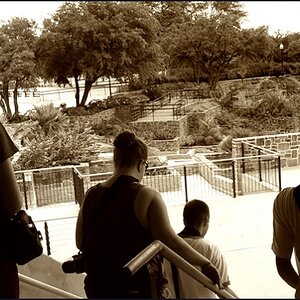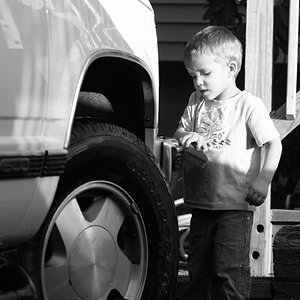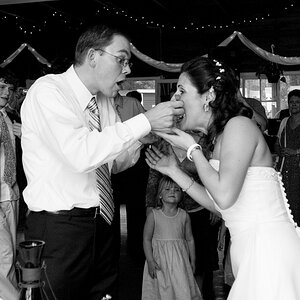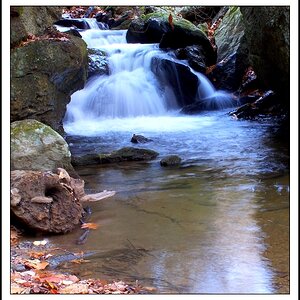radiorickm
No longer a newbie, moving up!
- Joined
- Jan 3, 2011
- Messages
- 186
- Reaction score
- 81
- Location
- South West New Mexico
- Can others edit my Photos
- Photos OK to edit
Well here is a top 10 list of things I wish someone would have told me when I started out.
#10 IF you are truly a newbie, this is going to hurt: Your new modern DSLR camera is a heck of a lot smarter than you are at this point. Over a hundred years of knowledge has been programmed into your camera. You need to spend (several) years to gain as much knowledge as it has.
#9 Ferraris are great cars; you just dont see to many farmers hauling hay in them.
Everything has a designed purpose. Your DSLR camera and Kit lens, are CAPABLE of taking great photographs; if they werent, they wouldnt be selling them. Really. Dont begin your career by believing that you are already limited and need better equipment. Until you begin taking specialized types of photos, your equipment is probably going to do just fine (once YOU learn how to use it to the best of its abilities).
#8 Until YOUR skill level outperforms your equipment, there is no real reason to upgrade. Now, if you only have a 18-55mm kit zoom and you decide to add a 55-250mm zoom, that is SUPPLEMENTING your capabilities, not upgrading. Ask your self this: What is it that I am capable of doing, that my equipment is not capable of? Rushing out and buying a $1,500.00 PRO lens is not going to make you a better photographer.
#7 You need to LEARN the rules, to know when its ok to BREAK the rules.
#6 You, as a modern day photographer have a wealth of TOOLS at your disposal to use; Auto-focus, Auto-exposure, Auto-bracketing, adjustable ISO, Image stabilization, just to name a few. Learn to take advantage of these tools; and just as importantly learn when NOT to.
#5 There is more to photography than the exposure triangle. We get stuck on Aperture/Shutter settings a lot, but there are many things as equally important, such as composition and perspective. First off, take lots of pictures. But also read lots of books, watch you-tube tutorial, do what ever you can to gain knowledge about all aspects of the hobby.
#4 Photography, as is any art, is very subjective. Each and every person has their views about it. You are always going to get the why didnt you do this question. Truth be told, if you get super-critical, you can nit pick anyones photos and find faults. But ultimately you have to decide if the photo met YOUR expectation, and if it didnt, figure out how to make it better next time. Of course, over time your expectations (especially of your own work) will become higher and you will work harder to achieve your goals.
#3 The IQ (Image Quality) is proportional to the amount of time used to create it. If you grab your camera and take a picture, you have a snapshot. If you take your time, set up the shot, compose carefully, follow the rules, then you are going to have a chance of having a photograph as a piece of art.
#2 GO SHOOT SOMETHING. In the days of old (film days) when you shot, you had to wait to get the film developed to see the results. It was in some cases a very time consuming adventure, and could become frustrating. With digital, and the EXIF information, you can see exactly what you did immediately and learn more effectively from your mistakes. PLUS it costs noting to delete a bad picture and try again. So take advantage of this, and have fun shooting lots of pictures.
#1. This is the single most important thing you can learn about photography:
It is the PHOTOGRAPHER that produces great images; not the equipment.
#10 IF you are truly a newbie, this is going to hurt: Your new modern DSLR camera is a heck of a lot smarter than you are at this point. Over a hundred years of knowledge has been programmed into your camera. You need to spend (several) years to gain as much knowledge as it has.
#9 Ferraris are great cars; you just dont see to many farmers hauling hay in them.
Everything has a designed purpose. Your DSLR camera and Kit lens, are CAPABLE of taking great photographs; if they werent, they wouldnt be selling them. Really. Dont begin your career by believing that you are already limited and need better equipment. Until you begin taking specialized types of photos, your equipment is probably going to do just fine (once YOU learn how to use it to the best of its abilities).
#8 Until YOUR skill level outperforms your equipment, there is no real reason to upgrade. Now, if you only have a 18-55mm kit zoom and you decide to add a 55-250mm zoom, that is SUPPLEMENTING your capabilities, not upgrading. Ask your self this: What is it that I am capable of doing, that my equipment is not capable of? Rushing out and buying a $1,500.00 PRO lens is not going to make you a better photographer.
#7 You need to LEARN the rules, to know when its ok to BREAK the rules.
#6 You, as a modern day photographer have a wealth of TOOLS at your disposal to use; Auto-focus, Auto-exposure, Auto-bracketing, adjustable ISO, Image stabilization, just to name a few. Learn to take advantage of these tools; and just as importantly learn when NOT to.
#5 There is more to photography than the exposure triangle. We get stuck on Aperture/Shutter settings a lot, but there are many things as equally important, such as composition and perspective. First off, take lots of pictures. But also read lots of books, watch you-tube tutorial, do what ever you can to gain knowledge about all aspects of the hobby.
#4 Photography, as is any art, is very subjective. Each and every person has their views about it. You are always going to get the why didnt you do this question. Truth be told, if you get super-critical, you can nit pick anyones photos and find faults. But ultimately you have to decide if the photo met YOUR expectation, and if it didnt, figure out how to make it better next time. Of course, over time your expectations (especially of your own work) will become higher and you will work harder to achieve your goals.
#3 The IQ (Image Quality) is proportional to the amount of time used to create it. If you grab your camera and take a picture, you have a snapshot. If you take your time, set up the shot, compose carefully, follow the rules, then you are going to have a chance of having a photograph as a piece of art.
#2 GO SHOOT SOMETHING. In the days of old (film days) when you shot, you had to wait to get the film developed to see the results. It was in some cases a very time consuming adventure, and could become frustrating. With digital, and the EXIF information, you can see exactly what you did immediately and learn more effectively from your mistakes. PLUS it costs noting to delete a bad picture and try again. So take advantage of this, and have fun shooting lots of pictures.
#1. This is the single most important thing you can learn about photography:
It is the PHOTOGRAPHER that produces great images; not the equipment.






![[No title]](/data/xfmg/thumbnail/39/39292-4169a355b794ae9735845c4ad45d06ff.jpg?1619738958)
![[No title]](/data/xfmg/thumbnail/39/39291-a89dc472765e04f66f617dd9acc8030d.jpg?1619738958)




![[No title]](/data/xfmg/thumbnail/39/39290-dfb3e819bd94a7f30797638ae1ae27cf.jpg?1619738958)
![[No title]](/data/xfmg/thumbnail/32/32805-61ca9a4fb87d37c0ef4f991ac1705e1f.jpg?1619735667)